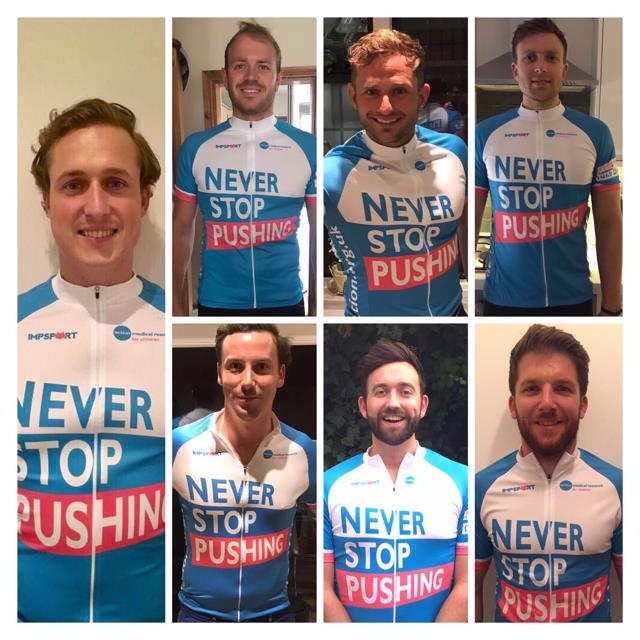Archived
Please note, this page may contain outdated information or subject matter.
The Magnificent Seven are gearing up forthe Prudential London-Surrey 100
It’s been awarded WorldTour status by the Union Cycliste Internationale (UCI) and is attracting some of the biggest names in cycling to the capital, but now the Prudential London-Surrey100 can add the ‘Magnificent Seven’ to its long list of riders.
The group of friends and colleagues from London are hoping to raise £2,800 for Action Medical Research.
They’ll be joining around 25,000 amateur cyclists (including 43 others fundraising for Action) who will be taking on the 100 mile challenge on Sunday 30 July.
The team will be forgoing Stetsons and checked shirts in favour of cycling helmets and Action cycling jerseys.
The ‘Magnificent Seven’ were inspired to take part by friends of the team Lucy Allen and her husband Anthony. Lucy admits the charity has a special place in their heart: “Action is just a tremendous organisation that helps fund vital medical research.
“In 2013, when our son Freddie was born, he suffered birth asphyxia (oxygen starvation) and seizures. He was transferred very quickly to ICU for him to have cooling therapy. This is where the core body temperature is dropped to try and help prevent any more swelling or injury to the brain.
“Freddie stayed there until he was warmed back up when they could start doing more testing. He was then transferred back to Leicester general special care unit before going home. Little baby Freddie is now a very happy, healthy four year-old!”
Latest data suggests over 1,200 babies develop a life-threatening brain condition called neonatal encephalopathy (NE) each year in the UK.1,2 Often caused by a shortage of oxygen to the brain around the time of birth, NE puts babies’ lives in immediate danger. Those who survive can be left with lifelong disabilities.
A baby is cooled by a few degrees with a purpose-made cap or with a special blanket or mattress, then gradually warmed again after two or three days. By cooling the body to reduce brain temperature, doctors can alter the chemical processes that lead to brain damage. Sadly though, this doesn’t save all babies.
Dr Ahad Rahim, of University College London, is investigating whether a commonly used diabetes medicine might improve babies’ chances.
Action Medical Research contributed to a 20-year programme of research in the 1900’s and 2000’s that led to the important finding that cooling a baby’s temperature down slightly for three days after birth improves their chances of surviving and escaping disability. This revolutionary cooling therapy is now being adopted in UK hospitals.
You can read more about birth asphyxia here and also about the research undertaken by Dr Ahad Rahim here.
Action Medical Research is a UK-wide children’s charity which funds desperately needed research to tackle the diseases that devastate the lives of so many of our children. It has been funding medical breakthroughs since it began in 1952 including helping to introduce the first polio vaccines in the UK, developing the use of ultrasound in pregnancy and testing the rubella vaccine.
The charity is currently funding research into conditions including asthma, prematurity, epilepsy, meningitis, cerebral palsy, brain cancer and some rare and distressing conditions.
- ENDS –
NOTES TO EDITORS:
To download a photo of the Magnificent Seven:
https://www.action.org.uk/sites/default/files/downloads/press/magnificent_seven.jpg
(Left: Ben Wilmot-Smith; Top row left to right: Matthew Taylor, Robin Trott and Andrew Mason; Bottom row left to right: Greg Talbot, Chris Darch and Stuart Croxford)
You can find out more about the team and sponsor them by clicking here:
https://www.action.org.uk/sponsor/magnificentseven
A total of 50 cyclists are raising funds on behalf of Action Medical Research.
References
1. Lee ACC et al. Intrapartum-related neonatal encephalopathy incidence and impairment at regional and global levels for 2010 with trends from 1990. Pediatric Research 2013; 74: 50-72.
2. Office for National Statistics. Vital Statistics: Population and Health Reference Tables. https://www.ons.gov.uk/peoplepopulationandcommunity/populationandmigration/populationestimates/datasets/vitalstatisticspopulationandhealthreferencetables Website accessed 18 September 2016.
For more information on Action Medical Research, contact Peter Denton, Fundraising Communications Officer, on:
T: 01403 327480
E:pdenton@action.org.uk
W: action.org.uk
Follow us on Twitter at @actionmedres and @amr_events
Like our Facebook page at facebook.com/actionmedres
Follow us at pinterest/actionmedres
Action Medical Research is a leading UK-wide charity saving and changing children’s lives through medical research. For 65 years we’ve helped pioneer ways to prevent disease and develop treatments benefiting millions of people. Our research has helped to beat polio in the UK, develop ultrasound in pregnancy, fight meningitis and prevent stillbirths. But we urgently need to develop more new treatments and cures for sick babies and children and we can’t do it without you.
Join our fight for little lives today.
Charity reg. nos 208701 and SC039284.

